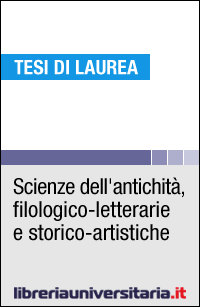
Defining the borders of a blank space: a postcolonial re-reading of Edwin Muir's An Autobiography and Scottish Journey
- Tipologia:
Tesi di Laurea di secondo livello / magistrale
- Anno accademico:
2008/2009
- Relatore:
- Carla Sassi
- Università:
Università degli Studi di Verona
- Corso:
Lingue e Letterature Straniere
- Cattedra:
Letteratura scozzese, studi postcoloniali
- Lingua:
- Inglese
- Pagine:
- 124
- Formato:
- Protezione:
- DRM Adobe
- Dimensione:
- 1.44 Mb
Descrizione Defining the borders of a blank space: a postcolonial re-reading of Edwin Muir's An Autobiography and Scottish Journey
A lifelong journey always begins with a first significant step, a move which will remain forever in our memories and which will determine the direction of our life. Edwin Muir, born in Wyre in 1887, was undoubtedly conscious of the deep influence that the past has on the present and devoted a large part of his literary production to an analysis of his own life as well as to an investigation of the myths which unite all human beings. Muir's autobiographical prose in particular responds to the author's wish to explore and understand his accomplishments as a man, a writer and a Scottish citisen. To carry out this ambitious project Muir inaugurated a process of analysis which involved introspection as well as a consideration of the scottish past and of human history in general. History is, according to Muir, the result of the intertwining of contingent human experiences and eternal returning myths, and represents a living force which moulds the present and opens up the way to future evolutions. The connection with the past, both individual and national, is for Muir an Ariadne's thread which may rescue the individual from the great evils of modernity – impersonality and inevitability – and drive him/her to salvation. The desire to locate experience within history is also the propelling force which drives Muir's autobiographical journeys, Scottish Journey (1935) and An Autobiography (1954), both expressive of the author's quest for cohesive individual and collective identities. Like many intellectuals born and educated in a country directly affected by the marginalizing, discriminating politics of the British Empire, in fact, Muir strongly felt the need to refresh his sense of nationhood through a reconnection with the past but at the same time he was conscious that the negotiation between traditional values and modern innovations initiated by colonialism had led to an irreversible problematisation of the concept of national identity. Scottish Journey and An Autobiography testify to Muir's controversial relationship with Scotland and to his desperate attempt to overcome the sense of fragmentation due in large part to its complex history. Given Muir's great concern with issues of individual and collective memory as well as with issues of identity, a proper way to begin the present postcolonial re-reading of Muir's autobiographical writings seems to be a brief presentation of his individual as well as of his professional life. Edwin Muir spent his childhood in the idyllic setting of his father's farm, ‘the bu', until increasing farm rents obliged the family to move, first to other Orkney's Islands and then to the suburbs of Glasgow. Although he only returned to orkney for holidays, the native archipelago remained for muir a central reference-point throughout his life. The move from the serene, rural setting of Orkney to industrialized Glasgow was so traumatic for Muir that he described it as a fall from a rural eden into a horrifying slum-like hell. The impact of the alien, disquieting environment of the city was further enhanced by a sequence of bereavements and separations which left muir alone and with poor prospects of improvements. His sense of solitude and the badly paid jobs which enabled him to get by in Glasgow made him, like many Scottish writers of the early twentieth century, closer to left-wing politics. In 1916 Muir began his writing career as a journalist for the new age under the encouragement of alfred orage and a few years later, in 1918, he published under the nom de plume ‘Edward Moore' his first book, We Moderns, a volume of nietzschean short essays and aphorisms. In the same year Muir met the novelist Willa Anderson, who would become his wife and professional partner, rescuing him from his pervasive nihilism. In the 1920s and 1930s, the couple travelled through europe, living in Czechoslovakia, Germany, Austria, Italy and France. During their journeys, which reinforced Muir's ‘diasporic identity', they witnessed some of the crucial events of twentieth-century european history, such as the spread of antisemitism and the rise of nazism, and met some of the leading intellectuals of the period. In these years, Muir became increasingly involved in continental modernism and, together with his wife, translated more than forty novels from German, including Franz Kafka's. He also gained a reputation as a literary critic and a poet, albeit his first poems were published only in 1925, when he was thirty-eight. Muir contributed widely also to the Scottish Renaissance debate through articles, reviews and critical essays on the authors and works associated with it. His Scott and Scotland (1936), a challenging book in which he outspokenly disproves the potentialities of Scots as a literary language and affirms that scottish literature would be more easily recognised and appreciated in Europe if it were written in English, earned him instant notoriety.


